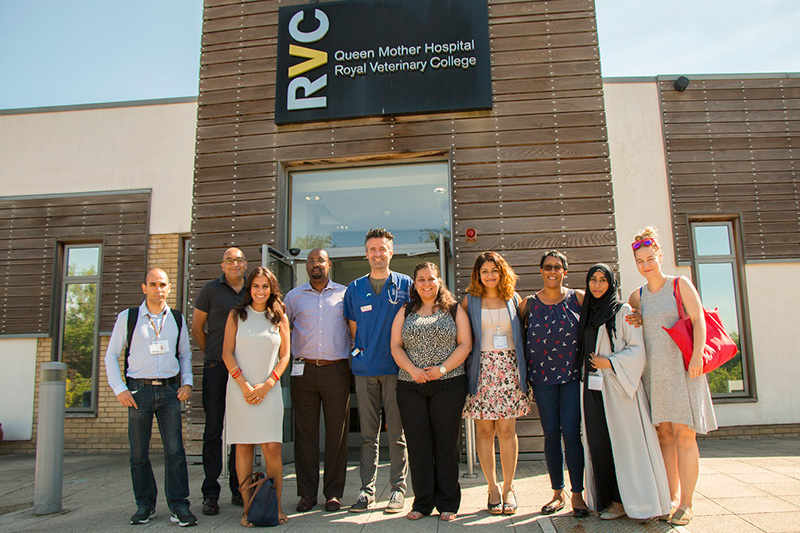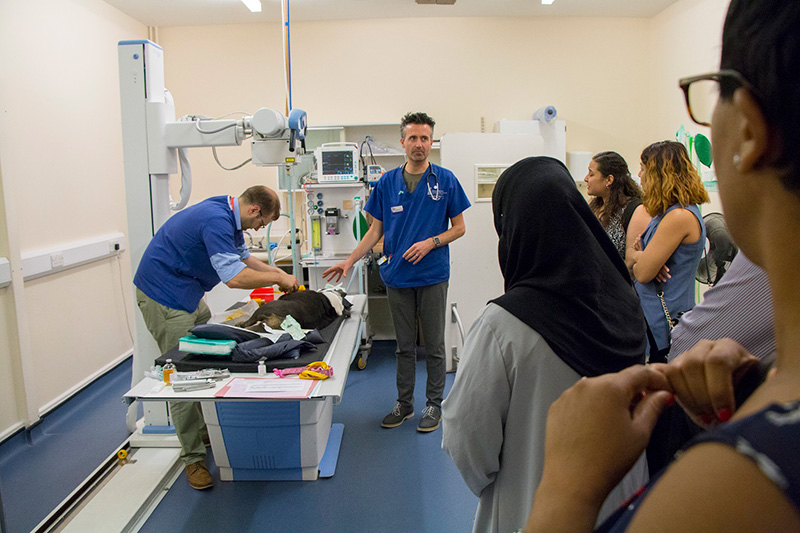Vets and NHS Staff Address Dangers Smokers Pose to Pets
The RVC recently hosted an NHS trust delegation, who visited the College’s small animal referral hospital to discuss the ill effects of smoking on the wider environment, including pets.
The group were shown around by Dr Stijn Niessen, Senior Lecturer in Internal Medicine, who told them about the advanced treatments and diagnostic imaging capabilities at RVC Small Animal Referrals, which is located at the Hawkshead campus near Potters Bar in Hertfordshire.

The RVC has long been at the forefront of the One Health initiative, which considers the interrelationships between human and animal health. The One Health paradigm recognises the relationship between health and disease at the human, animal and environment interfaces. It promotes a “whole of society” treatment of health hazards and a systemic change of perspective in the management of risk.
The impact of smoking fits into the One Health model as exposure to tobacco smoke can harm the health of pets, just as it can harm children and other family members.
While there has been a greater awareness of the dangers of passive smoking - and a resultant ban on smoking in public places - there is less awareness of the impact on second-hand smoke on domestic pets.
Commenting on the visit from the NHS delegates and explaining the focus of the exchanges, Dr Niessen said: "It is one of the RVC's main aims to improve health outcomes for all creatures great and small, and therefore for animals as well as for us humans. Spending time with a group of NHS professionals discussing the benefits of stopping with smoking for pets and people was an eye-opener for everyone involved.
“Apart from the science behind the negative health effects of smoking for humans and their pets, we shared thoughts about how to best change people’s behaviours; it was remarkable to hear how similar the challenges in this respect are for both a human health care professional and a veterinarian. We agreed that in order to create behavioural change, ongoing education about the specifics of these health effects is very important. Nevertheless, this also needs to translate into a positive, non-belittling, supportive and realistic action plan.”

Studies have found that dogs living in homes with smokers have significantly higher levels of cotinine (a product of nicotine) in their blood. This proves that dogs are absorbing nicotine through second-hand smoke.
It has also been demonstrated that environmental exposure to tobacco smoke increases the risk of dogs developing cancer of the nasal cavity, sinuses and lungs. The more cigarettes, cigars or pipe tobacco humans living with dogs smoke, the higher the chance that their pet will get cancer.
Dogs with longer snouts are at higher risk of developing nose and sinus cancer in a smoky household. This could be because their longer nasal passages accumulate more cancer-causing toxins. Dogs with short and medium-length noses were more than twice as likely to develop lung cancer if living in a home with a smoker. This is most likely because rather than cancer-causing toxins accumulating in the nasal passages they instead enter the dog’s lungs.
Cats living in households where people smoke have more than double the risk of developing malignant lymphoma (white blood cell cancer) than cats in homes where nobody smokes. This risk increases over time, with cats exposed for five years being more than three times as likely to develop the disease.
In addition to absorbing the toxins in tobacco by breathing it in, as pets groom themselves they can ingest toxins that collect on their fur. Another risk to pets is discarded cigarette butts that if swallowed by a pet can cause gastrointestinal problems or nicotine toxicity.
Although e-cigarettes do not emit smoke like traditional cigarettes, they pose a risk to pets if cartridges are swallowed. These contain higher levels of nicotine than cigarettes, and consequently can lead to potentially fatal nicotine toxicity if they are consumed by a pet. The scent and flavour of the liquid in cartridges can be enticing to pets, which increases the risk of ingestion.
The respiratory systems of birds are especially susceptible to airborne contaminants and, as a result, living in households with smokers poses a number of health risks. They have a heightened risk of developing lung cancer and pneumonia, and are also more likely to have problems with their heart, eyes and skin.
Other examples of “One Heath” initiatives the veterinary world and specifically the Royal Veterinary College are involved with are the study of diabetes, obesity, cancer, infection, environmental toxin-induced disease and immune-mediated disease (all emerging diseases among people and pets).
Press Office Contact
Uche Graves / Zoe Chadwick
T: 0800 368 9520
E: uche.graves@plmr.co.uk / zoe.chadwick@plmr.co.uk
Notes to Editors
The Royal Veterinary College (RVC) is the UK's largest and longest established independent veterinary school and is a constituent College of the University of London. The RVC offers undergraduate, postgraduate and CPD programmes in veterinary medicine, veterinary nursing and biological sciences, being ranked in the top 10 universities nationally for biosciences degrees. It is currently the only veterinary school in the world to hold full accreditation from AVMA, EAEVE, RCVS and AVBC.
A research-led institution, in the most recent Research Excellence Framework (REF2014) the RVC maintained its position as the top HEFCE funded veterinary focused research institution.
The RVC also provides animal owners and the veterinary profession with access to expert veterinary care and advice through its teaching hospitals; the Beaumont Sainsbury Animal Hospital in central London, the Queen Mother Hospital for Animals (Europe's largest small animal referral centre), the Equine Referral Hospital, and the Farm Animal Clinical Centre located at the Hertfordshire campus.
RVC Press Release 19 July 2017
See other Press Releases.

